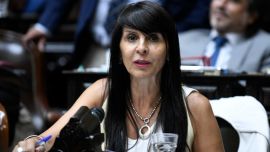Argentina’s lower house Chamber of Deputies on Wednesday granted approval to a government bill that would restructure the country's external public debt, which officials say is unpayable amid a deep recession.
The bill, presented initially by Frente de Todos lawmaker and president of the Budget Commission, Carlos Heller, passed with 228 votes in favour and just two against, after opposition Juntos por el Cambio lawmakers backed the project.
National public debt is US$311.251 billion, equivalent to 91.6 percent of its Gross Domestic Product (GDP), according to figures from the Ministry of Economy at the end of September 2019, the most recent figures. The amount to be renegotiated stands at around US$195 billion (57 percent of GDP), including debt with private bondholders and with bilateral and multilateral organisations, according to reports.
President Alberto Fernández expects to close negotiations with creditors before March 31, as he will then face heavy maturities.
With the support of the main opposition parties, the government of the Peronist leader appeared to have passage of the bill assured and that came to fruition as voting time arrived.
Some leftist groups opposed to it plan demonstrations outside of Congress this evening. The bill is likely to go to the Senate for passage next week.
Sustainable solution
The government's handling of the bill, in an extraordinary session, highlights the importance it attaches to the Argentina's large debt.
Economy Minister Martín Guzmán warned recently that Argentina needs “a sustainable solution” to paying its debt.
“Today the situation is critical, the debt burden cannot be sustained," he affirmed.
Argentina periodically faces financial crises and liquidity problems that have led it to refinance its debt. At the end of 2001, it declared a record default on just over US$100 billion during the worst economic crisis in its history.
It is currently dealing with a contracting economy, high inflation and a weakened currency.
The bill declares the sustainability of external public debt a “priority” and authorises the government to carry out a "restructuring of interest maturity services and capital amortization of public securities issued under foreign law."
It establishes that the executive will determine the nominal amounts.
The legislative debate takes place as Guzmán opens talks with the IMF to renegotiate the payment of some US$44 billion transferred to Argentina under a 2018 credit agreement worth more than US$ 56 billion. The talks will continue in February.
National pact
"It has been agreed that a collective will to overcome the problem will be manifested. The debt is the central problem of the Argentines. It is impossible to face the payment of the debt in these conditions. We are not going to stop assisting those who have the least to pay the debt," said lawmaker José Luis Gioja, president of the Justicialist Party (Peronism), during the debate.
Among other points, this law authorises the Executive to carry out "exchanges and/or restructuring of interest maturity services and capital amortization of public securities issued under foreign law," according to a copy of the initiative published in local media.
Heller proclaimed, before the start of the debate, that there wasa consensus on the need to renegotiate the debt and recalled that the 2015-2019 government of President Mauricio Macri acknowledged current payment plans were out of reach.
Macri's opposition coalition, Juntos por el cambio (Together for Change), agreed to support the bill in exchange for creating a working roundtable group to analyze the sustainability of the debts Argentina's provinces have with the federal government.
Left-wing lawmaker Nicolás de Caño criticised the pact between the Fernández's government and the opposition that he said would be used to "pay the fraudulent debt that Macri left us."
– TIMES/NA/AP/AFP



















Comments